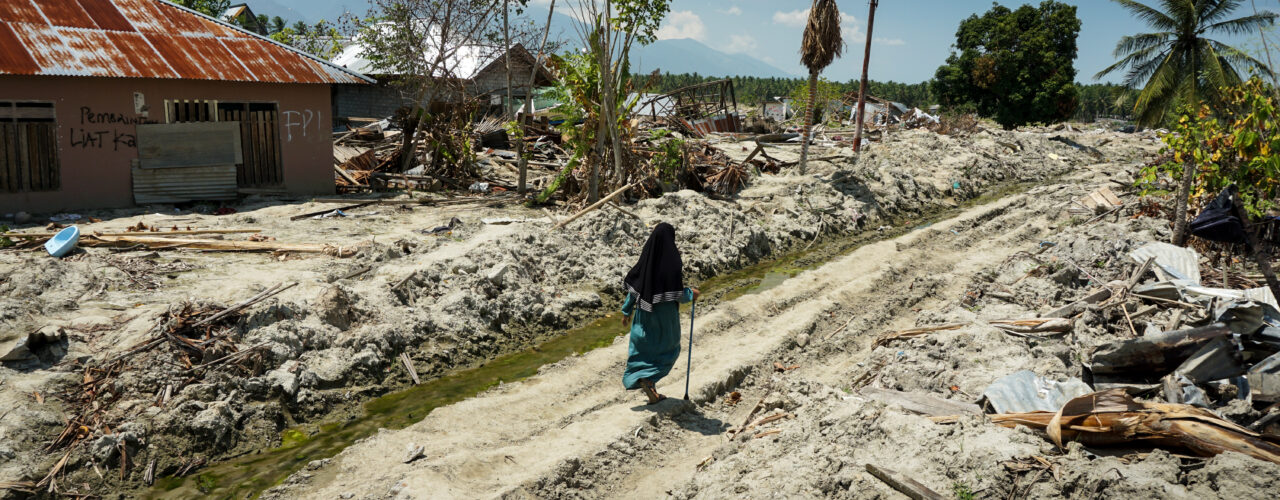A fundamental (climate) change

The need for a fundamental change
In recent years Bruno Jochum has seen a shift in the humanitarian sector already, especially when it comes to recognizing the responsibility of organisations to change their practices in order to reduce their ecological footprint. However, the main problem according to him, is that most organisations are not mainstreaming the issue. Jochum: “It’s still considered a technical file, like a separate section of logistics. Organisations don’t acknowledge how deep the transformation will be in the coming years”. Jochum argues that this transformation needs to be profound and linked to other shifts in the humanitarian sector, such as the move towards localisation. All these different agendas need to be combined into a relatively radical transformation, which will contribute to the reduction of the footprint of humanitarian organisations.
What are the stumbling blocks?
Besides the treatment of environmental action as a separate file instead of mainstreaming it, Aline Hubert of Groupe URD addresses other obstacles the aid sector faces when it comes to the reduction of its own ecological footprint. The first, and a quite obvious one, is the dependency of the sector on globalisation. The reliance of the sector on the fast exchange of services and goods generates lots of emissions. A second aspect contributing to the complexity, is the clash between the different timescales of humanitarian aid and environmental issues. The latter have a long-term dynamic and this doesn’t collide with the short-term and emergency-based projects of humanitarian action. To tackle this issue, Groupe URD suggests the sector should define medium and long-term strategies in order to anticipate, extend funding cycles and duration of projects, give time to understand and act on environmental issues and lastly, make work of reducing human resources turnover. A third aspect mentioned by Hubert is the unclear scope of responsibility. Because all of our practices are contributing to the effects of climate change, it’s difficult to determine who has to take responsibility.
Everybody’s business is nobody’s business. To tackle this issue institutional leadership must be strengthened, it’s their task to choose priorities and develop policies and action plans.
Lastly, there are some external limits with which the humanitarian sector has to deal with, for example certain areas of intervention which are not properly equipped to deal with environmental issues.

A new paradigm
The broad/combined approach to this organisational transformation as viewed by Jochum is shared by Groupe URD. The French think tank suggests that the way to move forward and overcome the obstacles mentioned above is to build a new paradigm. The existing structures and workways are preventing the humanitarian sector from the organisational transition that is necessary. The sector needs to move from a project-based approach to a comprehensive approach via developing networking capabilities, collective learning, pooling resources and by moving towards a nexus approach (aligning emergency aid, development and peacebuilding). Additionally, the sector needs to rely more heavily on actors who know the complexity of local situations (geographical, environmental, cultural, social, economic and political etc.). Lastly, a paradigm switch needs to be made regarding the value we have for environmental considerations. Environmental value should be considered every step of the way, and should become more prominent than the value for money.
A push for change
As a donor DG ECHO developed a strategy to stimulate sustainable humanitarian action and reduce the environmental footprint of the humanitarian sector. It was released in 2020, and sets out the key areas of intervention: CO2 emissions, waste management, energy efficiency, supply chain and logistics, water management, biodiversity and habitat preservation and localization of resources. As a main deliverable of this strategy, DG ECHO then developed a set of minimum environmental requirements, published at the beginning of 2022. In order to build up capacity in the sector, the requirements are not yet mandatory but serve as recommendations. However, Karolina Kalinowska announces that from 2023 onwards, the list of environmental requirements is going to be mandatory. As part of their environmental inclusive approach ECHO developed a ‘Guidance on the operationalisation of the minimum environmental requirements and recommendations for EU-funded humanitarian aid operations’ (pdf), and they have set up online training modules in an effort to stimulate greener action. This means that projects that will be funded by ECHO from 2023, will need to comply with the requirements set by ECHO. The applicability of the requirements will depend on the characteristics of the project, its context and whether the humanitarian situation has stabilized, allowing for flexibility in their application. In early stages of an emergency response time may be limited to conduct environmental screenings and implement certain requirements. However, as soon as a needs assessment is being done, environmental considerations should be embedded within it.

Investing in environmental approaches is investing in humanitarian action
For many humanitarian NGOs it is difficult to make the first investments, not all have fundings available for the first changes. Funding is usually bound to a specific destination and time frame, but there is a strong need for flexibility because the environmental considerations need to be integrated into the overall agendas, not just at project level but throughout all practices. With scarce funding available in this sector it can be valuable to figure out how to navigate other sources of funding such as private institutions, campaigns, climate funds or philanthropy. Kathrine Vad considers investing in environmental approaches as a form of humanitarian action, especially if you view it an anticipatory movement.
We need to prevent the impacts rather than respond to them.
Read more about the series on climate change here.
